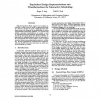Free Online Productivity Tools
i2Speak
i2Symbol
i2OCR
iTex2Img
iWeb2Print
iWeb2Shot
i2Type
iPdf2Split
iPdf2Merge
i2Bopomofo
i2Arabic
i2Style
i2Image
i2PDF
iLatex2Rtf
Sci2ools
118
click to vote
ICCAD
1992
IEEE
1992
IEEE
Equivalent design representations and transformations for interactive scheduling
High-level synthesis (HLS) requires more designer interaction to better meet the needs of experienced designers. However, attempts to create a highly interactive synthesis process are hampered by incompatibility of various representations used during synthesis. To overcome this problem, equivalent representations are needed, as well as equivalence-preserving synthesis transformations. We present the Structured Finite State Machine (SFSM) design model for scheduled behavior, show its equivalence to the Control/Data Flow Graph (CDFG) model, and define primitive behavior-preserving transformations for scheduling. We have integrated this model and these transjormations into the BIF interactive environment to enable manual rescheduling of a design.
Equivalence-preserving Synthesis Transformations | Hardware | ICCAD 1992 | Interactive Synthesis Process | Primitive Behavior-preserving Transformations |
Related Content
| Added | 10 Aug 2010 |
| Updated | 10 Aug 2010 |
| Type | Conference |
| Year | 1992 |
| Where | ICCAD |
| Authors | Roger P. Ang, Nikil D. Dutt |
Comments (0)

